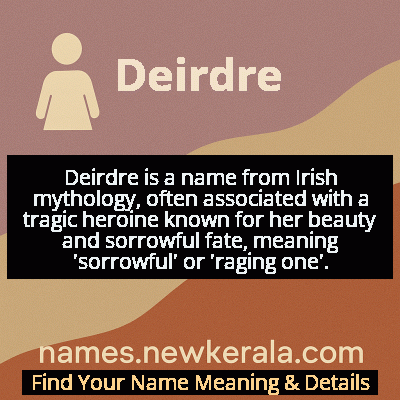Deirdre Name Meaning & Details
Origin, Popularity, Numerology Analysis & Name Meaning of Deirdre
Discover the origin, meaning, and cultural significance of the name DEIRDRE. Delve into its historical roots and explore the lasting impact it has had on communities and traditions.
Name
Deirdre
Gender
Female
Origin
Gaelic
Lucky Number
9
Meaning of the Name - Deirdre
Deirdre is a name from Irish mythology, often associated with a tragic heroine known for her beauty and sorrowful fate, meaning 'sorrowful' or 'raging one'.
Deirdre - Complete Numerology Analysis
Your Numerology Number
Based on Pythagorean Numerology System
Ruling Planet
Mars
Positive Nature
Generous, passionate, energetic, and humanitarian.
Negative Traits
Impulsive, impatient, moody, and can be overly emotional.
Lucky Colours
Red, maroon, scarlet.
Lucky Days
Tuesday.
Lucky Stones
Red coral, garnet.
Harmony Numbers
1, 2, 3, 6.
Best Suited Professions
Military, sports, philanthropy, leadership roles.
What People Like About You
Courage, energy, leadership, generosity.
Famous People Named Deirdre
Deirdre O'Connell
Actress
Tony Award-nominated actress known for her work in theater and film
Deirdre Lovejoy
Actress
Known for her role as Rhonda Pearlman in HBO's 'The Wire'
Deirdre McCloskey
Economist and Academic
Distinguished professor of economics, history, and English at University of Illinois
Deirdre of the Sorrows
Mythological Figure
Central tragic heroine of the Ulster Cycle in Irish mythology
Name Variations & International Equivalents
Click on blue names to explore their detailed meanings. Gray names with will be available soon.
Cultural & Historical Significance
The tale has been retold for centuries in Irish literature, poetry, and drama, symbolizing both the power of love and the inevitability of fate in Celtic culture. Deirdre's story became particularly important during the Irish Literary Revival of the late 19th and early 20th centuries, when writers like W.B. Yeats and J.M. Synge adapted her tragedy for the stage. Her narrative continues to resonate as a powerful archetype of feminine agency, romantic tragedy, and the destructive power of beauty in a patriarchal society. The enduring appeal of Deirdre's story speaks to universal themes of love, loss, and the struggle against predetermined destiny.
Extended Personality Analysis
Women named Deirdre are often perceived as intense, passionate, and deeply emotional individuals. The name's association with the tragic mythological figure suggests someone with strong convictions and the courage to follow their heart, even against societal expectations. Deirdres are typically seen as romantic idealists who value deep emotional connections and authenticity in relationships. They often possess a magnetic personality that draws others to them, combined with a certain melancholy depth that gives them emotional complexity.
Many Deirdres display artistic sensibilities, creative talents, and a strong sense of intuition. While they can be fiercely independent and determined, they also carry a vulnerability that makes them sensitive to life's emotional currents. Their combination of strength and sensitivity often makes them compelling figures who leave lasting impressions on those they encounter. The name suggests someone who experiences life intensely, with a capacity for both great joy and profound sorrow. Deirdres are often admired for their authenticity and emotional honesty, though they may struggle with the weight of their own emotional depth. Their personality reflects the name's Gaelic meaning of 'raging' - not in anger, but in the intensity of their passions and convictions.
Modern Usage & Popularity
Deirdre remains a recognizable though not overly common name in English-speaking countries, particularly in Ireland and among Irish diaspora communities. The name peaked in popularity in the United States during the 1950s and 1960s but has since declined, making it a distinctive choice for parents seeking a traditional Celtic name that isn't overly trendy. In contemporary Ireland, Deirdre maintains moderate usage, often chosen by parents who appreciate its deep cultural roots and literary associations. The name appeals to those looking for a name with historical significance and emotional depth, while its relative rarity in recent decades gives it a classic yet distinctive quality. Modern Deirdres often find their name serves as a conversation starter about Irish heritage and mythology, and many appreciate the connection to one of Ireland's most enduring literary figures. The name's decline in popularity since its mid-20th century peak means that most contemporary Deirdres are adults, giving the name a sophisticated, established quality rather than a youthful or trendy one.
Symbolic & Spiritual Meanings
Symbolically, Deirdre represents the tension between beauty and tragedy, love and destiny. Her name has come to symbolize the idea of doomed beauty and the power of love to transcend social conventions. The 'sorrow' in her story represents not just personal tragedy but the broader human experience of loss and the inevitability of fate. Deirdre embodies the Celtic concept of 'geis' or sacred taboo - the idea that certain destinies cannot be avoided, no matter how one tries to escape them. Her story symbolizes the conflict between individual desire and societal expectations, making her a timeless representation of romantic tragedy. The name also carries connotations of resilience in the face of heartbreak and the enduring power of memory and storytelling to preserve love beyond death. In a broader sense, Deirdre symbolizes the idea that great beauty often comes with great cost, and that the most profound human experiences are often those marked by both intense joy and deep sorrow. Her legacy reminds us that some stories are so powerful they transcend their original cultural context to speak to universal human experiences.

